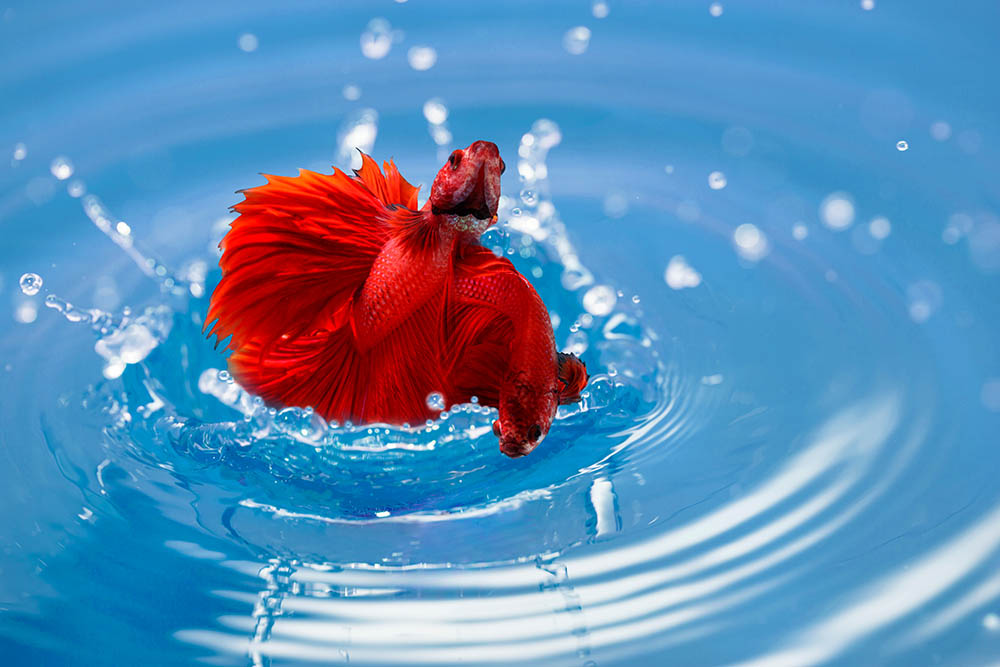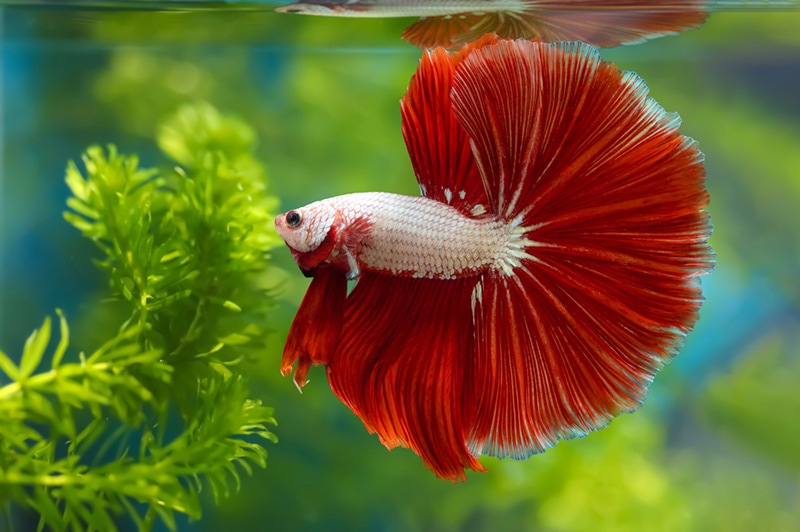How Long Do Betta Fish Live? How to Help them Live Longer

Updated on
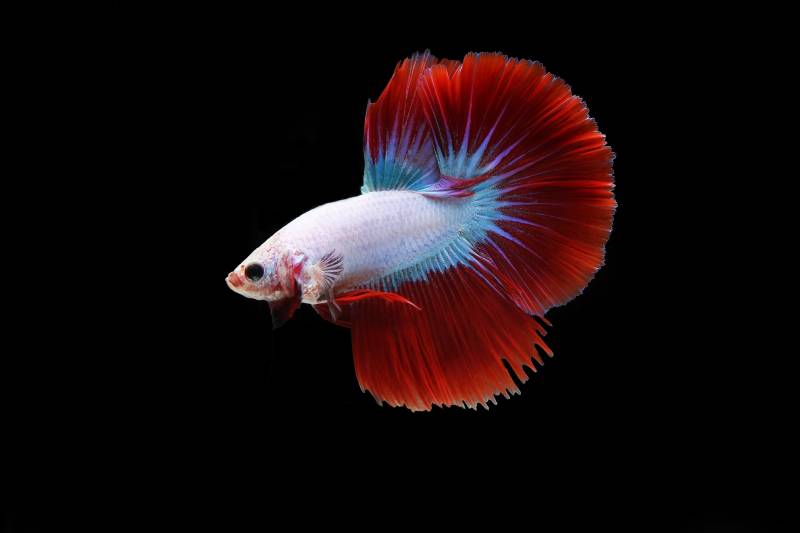
Click to Skip Ahead
How great would it be if you knew how long something was going to last before you bought it? You wouldn’t worry about warranties, and you could plan ahead for when the day came to replace it. Unfortunately, that’s not how things work.
There are no guarantees in life, but there are steps we can take to max out the longevity of anything we buy, no matter if it’s a new car, a new plant, or a new fish. So how long do betta fish live? And what can we do help them live longer? In this article, we’ll look at how long you can reasonably expect a betta to live.
Betta fish can live an average of 2-4 years depending whether they live in an adequate aquarium or in the wild.
Average Lifespan for Betta Fish
Bettas are native to the marshes and rice paddies of Vietnam, Cambodia, Malaysia, and Thailand (which is why they are sometimes known as Siamese Fighting Fish, Thailand having formerly been named Siam).
In the wild, they have a life expectancy of about 2 years. This may not seem like long, but you have to consider all the variables working against longevity in the wild. It really is an eat-or-be-eaten world out there!
Bettas kept in captivity and properly cared for may live considerably longer. Given reasonable quality of care, betta adequately housed in an aquarium can live about 4 years on average.
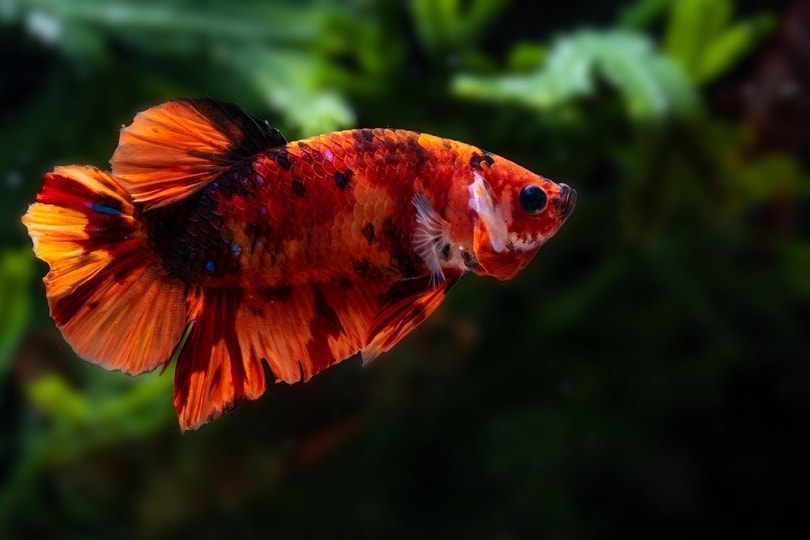
What is the Oldest Ever Betta Fish?
Although Guinness doesn’t list a world record for the oldest betta, there are stories of bettas living as long as ten years. One would have to imagine this happens extremely rarely (and let’s be frank, that’s if it happened at all!) and only under the most ideal conditions, plus aided by a bit of good luck, too. Many aquarists report having kept bettas for as long as 7 or 8 years.
The 5 Tips to Help Your Betta Live Longer
Again, there are no guarantees, but there are lots of things you can do to help your betta live a long and healthy life. Here are some of our top tips for extending your fishes lifespan.
1. Use a Proper Aquarium
A cup, bowl, or vase is no place for a betta (or any fish), no matter how you see them displayed at pet stores. To stay healthy, a fish needs clean, healthy water, and that means a proper aquarium complete with a filtration system and more than likely a heater. (You can learn more in the guide: What size tank do betta fish need.)
There are many stories out there about how bettas are found in tiny ponds and puddles, cut off from larger bodies of water. This is entirely true; they have adapted to survive during the dry season if they get stranded in small places. But only temporarily!
Amazingly, they can jump and flop about from one puddle to the next until they reach a suitably large area of water.
This is partly because they have what’s called a labyrinth organ. This highly specialized organ allows the betta to draw oxygen right from the air. Provided it stays moist, they can survive outside of water for a shockingly long time, breathing the air like we do.
So, while they can survive in close quarters for a while, they can’t live there for very long. Get that betta out of the cup or bowl and into a nice aquarium ASAP!

2. Keep Clean Water for Healthy Living
You may have read that betta commonly live in still, brackish water in the wild, so therefore yours at home can live in the same conditions. This is only partly true.
Yes, the water can be a bit murky from sediment, but it’s still clean. The natural flow of water and the abundance of plants acting as filters, keep the water cleaner than it looks.
Chances are your betta has been bred from a long line of fish that have only ever lived in captivity. They are far removed from their wild ancestors, and while they retain many of their characteristics, they have different needs.
For a happy, healthy fish, you want nice clean water, and probably a filtration system. Live plants suitable for betta are still a great idea, though!
For more information, you can check our guides on to choosing filters for betta, and the best canister filters and best hob filters available today.
3. Slow the Flow
If you’re using a tank larger than a few gallons in volume, you’ll want a filtration system. But, because they’re built for slow-moving water, and despite a surprising ability to jump, bettas are not great swimmers.
Make sure the rate of flow is gentle, or your betta will have to work too hard to swim around. Aquariums with incorporated intakes (like the BioCube) can be very hazardous if the flow is too fast, and your fish may end up plastered against it.
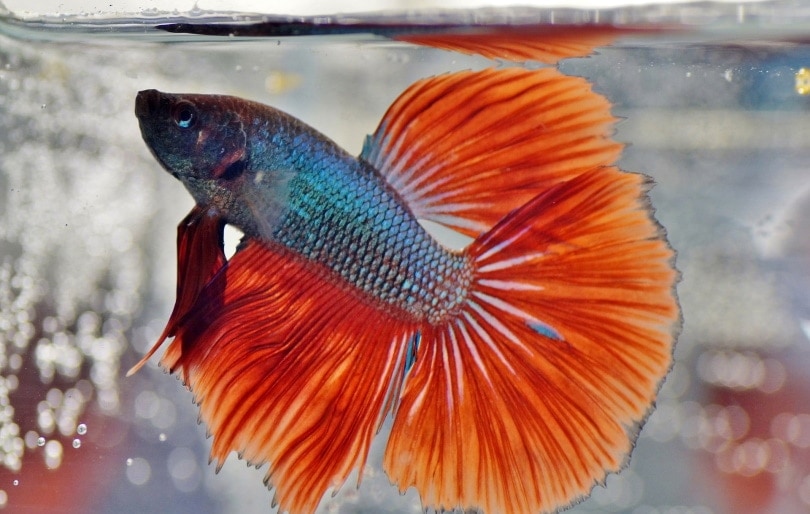
4. Maintain a Consistent Temperature
The weather doesn’t change much where betta come from. It’s usually either hot and wet, or hot and dry. That means the temperature of the water they live in doesn’t change much, either. As such, a betta does not endure extremes of temperature well.
To give your betta the most comfortable environment you can, use an aquarium heater to keep the temperature between 76F – 81F (24C – 27C), make sure you have an aquarium thermometer to monitor the temps.
5. Feed Your Betta a Varied Diet
While they aren’t little piranhas, bettas are definitely carnivores. It’s important they get enough protein to help them stay healthy and live a long life.
Live, frozen (and then thawed), and freeze-dried proteins like shrimp, daphnia, and bloodworms are typical favorites on a betta’s menu. Mix it up with pellets and flakes, too. A varied diet is the healthiest diet.
Bettas can be fussy, so be mindful of what yours does and does not eat. There’s no point wasting your money and your fishes health by continuing to offer food it doesn’t want.
You can learn more in our guide to the best foods for betta fish.
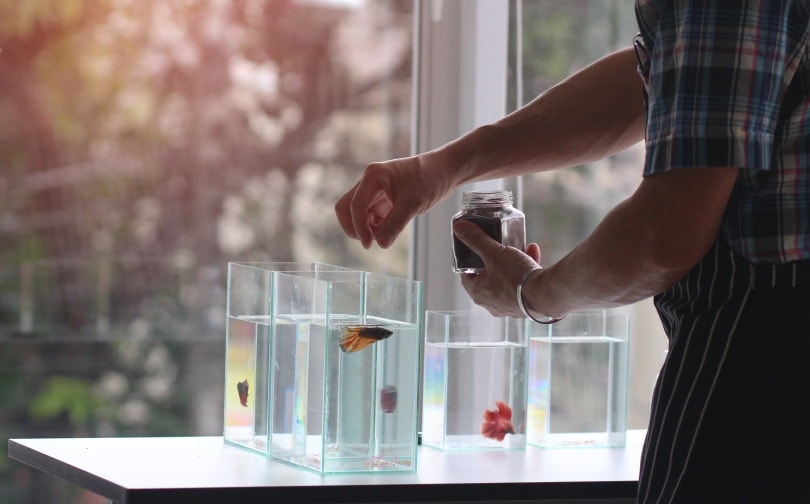
Life Stages of Guppies
Fry Stage: Newborn–4 weeks
The fry stage is the most essential part of a guppy’s life, as this is the time when they are most vulnerable and require the most care. If you don’t want adult fish to eat the babies during this stage, you must separate frys into a separate aquarium. These little guys need weekly water changes to maintain water quality, several small meals throughout the day (about four or five), and their light should be kept on anywhere from 8 to 12 hours each day (as this helps with spinal growth).
Juvenile Stage: 4 weeks–6 weeks
Most guppies will reach the juvenile stage by 4 weeks of age, but some may not get there until closer to 6 weeks. At this point, you can determine the sex of your new guppies.
Teen Stage: 6 weeks–6 months
During the teen stage, guppies become sexually active. If you don’t want more baby guppies, you need to separate the sexes at this point. By this stage, the guppies will also be large enough to be put back in the original tank without risk of being eaten (as long as they are large enough not to fit in another fish’s mouth!). Be sure your guppies are receiving proper lighting and adequate nutrition at this point, too, or deformities could develop.
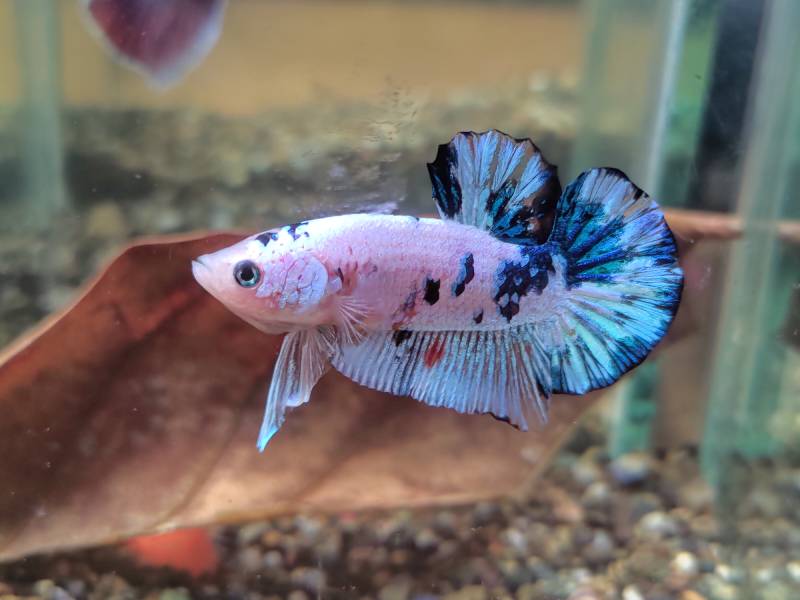
Adult Stage: 6 months+
Congratulations, your guppy is an adult! Any more growth they may experience will be quite slow at this stage. During the adult years, continue to ensure your guppy is receiving the food and lighting they need to live their longest life.
How to Tell Your Guppy’s Age
There’s no way to determine your guppy’s exact age. However, a few things can clue you in to an age range.
If a guppy is 4 weeks old or under and is still in a tank with adult guppies, they will scurry about and stay hidden as best as they can to avoid being eaten. If you can tell what sex your guppy is, then they’re a juvenile or older. And if a guppy is large enough not to be eaten by another fish, they’re a teen or adult.
And if you see your guppy being less active, eating less, or it appears their color is fading, then they’re probably getting closer to the end of their life.
Final Thoughts
We hope after reading this article you’ll be inspired to care for your betta as best as you possibly can. They are beautiful fish and very rewarding for any aquarist. Properly cared for, they can provide years of enjoyment.
If you’ve kept bettas before, how long did your oldest live?
If you have other questions about caring for any aquarium fish, please check out the rest of the site for all the information you need to make life better for your fish. And if you can’t find it here, just ask and we’ll see what we can do!
We appreciate you taking the time to check us out today. Thanks for letting us be your source for the best aquarium info on the ‘net!
Happy fish keeping!
See Also:
- The Natural Habitat of Betta Fish: History, Diet & FAQs
- Why Do Betta Fish Fight Each Other? What You Need to Know
Featured Image Credit: Benzstock, Shutterstock




